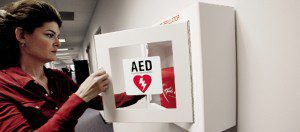By Lauren S. Josephson, Esq. –
 Avast majority of community associations around the nation offer the use of certain health club facilities to their members unaware of the fact that people are 15 to 20 times more likely to die of sudden cardiac arrest during vigorous exercise, or within 30 minutes following it.1 Therefore, a community association offering the use of such facilities must take into consideration the following:
Avast majority of community associations around the nation offer the use of certain health club facilities to their members unaware of the fact that people are 15 to 20 times more likely to die of sudden cardiac arrest during vigorous exercise, or within 30 minutes following it.1 Therefore, a community association offering the use of such facilities must take into consideration the following:
(1) Whether the association-has a duty to provide certain remedial measures? and;
(2) If an association were to acquire a cardiac survival device a/k/a an automated external defibrillator (AED), would the association be subject to civil liability for any harm resulting from the use or attempted use of such device?
In short, the answer to both questions is No. Florida’s Good Samaritan Statute, s. 768.13, Fla. Stat., and the Federal Cardiac Arrest Survival Act of 2000 as codified under, s. 768.1325, Fla. Stat. (collectively, the “Acts”) provide that any person (in which the term “person” includes an association), is immune from civil liability for any harm resulting from the use or attempted use of such device; and in addition, any person and/or association who acquired the device is immune from such liability.
The association must be wary of the fact that the immunity provided by the Acts would not extend to an association if the victim succumbed to further injuries from the use of an AED that was not (1) properly maintained and tested in accordance with the information provided, or (2) sustained avoidable injuries as a result of the association’s failure to properly train an employee of the association who was reasonably expected to use the device. The latter would not apply if the AED were to be equipped with audible, visual, or written instructions on its use, including any such visual or written instructions posted on or adjacent to the device. In order to ensure the association is fully protected and granted immunity under the foregoing Acts, the following must be considered and acted upon:
1. Determine whether the AED device is equipped with audible, visual or written instructions on its use; if not, the association must provide appropriate training in the use of the device to an employee or agent of the association expected to use the device in the event of a presumed cardiac emergency. See, Fla. Stat. s. 1006.165.
2. Ensure that the device is properly maintained and tested in accordance with the manufacturer’s recommendations. According to one of the leading manufacturers of AED devices – Philips HeartStart AED- a monthly inspection of an AED device is recommended to make sure that:
a.) The green light is still flashing on the front of the device.
b.) No damage has been done to the device.
c.) None of the parts need to be replaced, etc.
Currently, most AED devices are equipped with audible, visual, and written instructions. This would negate an association’s duty to provide proper training to its Association employees expected to use the AED device in the event of an emergency.
All in all, an association, including its developer, directors, officers and their agents and/or employees of the association, along with any persons outside the umbrella of the association’s corporate structure who may use the AED device, will be immune from civil liability, so long as the foregoing considerations are analyzed and certain actions are taken to ensure the AED device remains in good working order.
1 Howard L. Pomerantz, When Exercise Turns Deadly, 40-JUN Trial 24, 25 (2004). Citing, James Rippe & Howard Pomerantz, Saving Lives in the Fitness World, IHRSA 21ST ANNUAL INTERNATIONAL CONVENTION (Mar. 8, 2002).
This Article does not constitute legal advice and may not be relied upon as such. Each individual’s facts and circumstances are different. If you have any questions regarding your particular situation, please consult with legal counsel.
Lauren S. Josephson, Associate
Salvatori, Wood, Buckel, Carmichael & Lottes
Lauren Josephson’s practice focuses on real estate, real estate development and business law. Mrs. Josephson is licensed to practice law in the State of Florida.
Bar Admissions: 2012, Florida
Education:
Ave Maria School of Law (J.D., 2012)
Florida Gulf Coast University (B.A., 2007, magna cum laude)
Professional Activities and Experience:
Member: Florida Bar Association; Collier County Bar Association; Florida Council Against Sexual Violence









